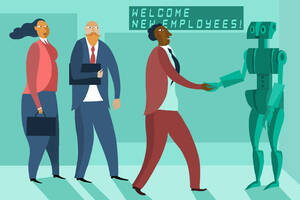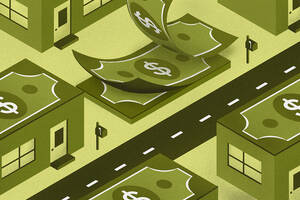Policy Finance & Accounting Economics Jul 1, 2010
Money and Mores in the Mortgage Meltdown
When “illegal” and “immoral” failed to coincide
Deregulation dominated the last forty years of American policy discussions, reaching a fevered pitch in the last decade. The mantra was echoing throughout Washington, D.C., but one particular government press conference epitomized the deregulators’ zeal. On June 3, 2003, government officials from five agencies—including the Federal Deposit Insurance Corporation and the Office of Thrift Supervision (OTS)—announced efforts to help bankers “cut through red tape.” They staged a photo-op, posing with pruning shears aimed at a stack of official-looking books bound in red ribbon. James Gilleran, director of the OTS, decided pruning shears undersold the message. He posed with a chainsaw instead.
The press conference was riding the cresting tide of deregulation, but the trend created conditions that led to the subprime collapse. Now, the tide appears to be turning, and according to a paper by Paul Hirsch, a professor of management and organizations at the Kellogg School of Management, and Mary-Hunter Morris, a doctoral candidate in the same department, the swing away from deregulation is but the latest in a long history of oscillations between greater and lesser government oversight.
“Markets basically need to operate with rules. And what I think we saw happen was the rules were taken away,” Hirsch says. “But I think the pendulum is going to swing back some.”
“This has happened over and over again,” Morris adds. “When things become really, really regulated, you get a push back from the organizations that say, ‘You’re holding us back from being able to take advantage of the free market.’ Then you get really, really deregulated and stop monitoring and a whole slew of scandals emerge.”
History’s Pendulum
Hirsch and Morris chronicled a number of such oscillations throughout the history of the United States, each time swinging back and forth between two different economic ideologies—the rights-based and the profit-based frameworks. In 1776, the United States began within a rights-based framework. Corporations had to prove they served the public interest to win a concession from the government. But by 1820 that idea was out of vogue and corporations pursued profit with little oversight. The Progressive Era that began in 1890 saw the pendulum again swing the other way, but the Roaring Twenties would bring profit-based views back. The Great Depression put a swift end to that, ushering in a relatively long period of modest populist attitudes that would last until 1980.
The latest era, ushered in during the Reagan years and punctuated by the subprime mortgage crisis, was defined by deregulation according to Hirsch and Morris. Profit again reigned supreme, and theory held that deregulation and the pursuit of profit would conspire to lift society’s prospects. “And it looked for a long time like it was going really well,” Morris says.
Without regulators keeping watch, executives resorted to increasingly risky measures to pad balance sheets. And if one company’s gamble paid off, its peers were compelled to follow. “As long as the music is playing, you’ve got to get up and dance,” Citigroup chief executive Charles Prince said in 2007, adding, “We’re still dancing.”
But, Hirsch notes, “if someone took the record off, a lot of these guys would have stopped dancing.” Adding regulation, he argues, would have saved Citigroup and their ilk from themselves, protecting the rest of the economy in the process. “That’s not to say you want the rules to be draconian, but if there are no rules at all, things get out of hand,” he observes.
Fewer rules may have facilitated greater profits in the short term, but they ended up damaging the economy as a whole. “There’s been an enormous amount of loss on the part of small business,” Hirsch points out.
Judicial Influence
Despite the recent regulatory fervor in Washington, D.C., Hirsch and Morris suspect substantive changes will be years off. Judicial appointments, they say, are partially responsible for the laissez faire economic climate that has emerged over the years. And because of their life terms, judges and their judicial philosophies often lag behind current administrative and legislative priorities. Although there have been a few high-profile appointments of late, the majority of the judiciary was appointed by previous, deregulation-favoring administrations.
Many judges currently sitting on the bench tend to rule in favor of businesses, Hirsch and Morris say, granting companies greater leeway when ruling on regulatory issues. Businesses not only encountered fewer and fewer regulations over the past four decades, but those that did exist were not stringently enforced, Hirsch and Morris found.
The solution, Hirsch suggests, is more complex than the recent string of legislation. Reining in the financial sector through more stringent regulations is a start, he says, but it is only half of the equation. Judicial appointments are the other part. “It isn’t so much that the law has to be changed, as also how it gets interpreted.”
Hirsch, Paul and Mary-Hunter Morris. 2010. Immoral but not illegal: Monies vs mores amidst the mortgage meltdown. Strategic Organization. 8(1): 60-75.


